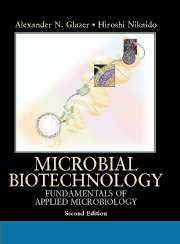Book contents
- Frontmatter
- Contents
- Preamble
- Acknowledgments
- 1 Microbial Diversity
- 2 Microbial Biotechnology: Scope, Techniques, Examples
- 3 Production of Proteins in Bacteria and Yeast
- 4 The World of “Omics”: Genomics, Transcriptomics, Proteomics, and Metabolomics
- 5 Recombinant and Synthetic Vaccines
- 6 Plant–Microbe Interactions
- 7 Bacillus thuringiensis (Bt) Toxins: Microbial Insecticides
- 8 Microbial Polysaccharides and Polyesters
- 9 Primary Metabolites: Organic Acids and Amino Acids
- 10 Secondary Metabolites: Antibiotics and More
- 11 Biocatalysis in Organic Chemistry
- 12 Biomass
- 13 Ethanol
- 14 Environmental Applications
- Index
- Plate section
9 - Primary Metabolites: Organic Acids and Amino Acids
Published online by Cambridge University Press: 05 June 2012
- Frontmatter
- Contents
- Preamble
- Acknowledgments
- 1 Microbial Diversity
- 2 Microbial Biotechnology: Scope, Techniques, Examples
- 3 Production of Proteins in Bacteria and Yeast
- 4 The World of “Omics”: Genomics, Transcriptomics, Proteomics, and Metabolomics
- 5 Recombinant and Synthetic Vaccines
- 6 Plant–Microbe Interactions
- 7 Bacillus thuringiensis (Bt) Toxins: Microbial Insecticides
- 8 Microbial Polysaccharides and Polyesters
- 9 Primary Metabolites: Organic Acids and Amino Acids
- 10 Secondary Metabolites: Antibiotics and More
- 11 Biocatalysis in Organic Chemistry
- 12 Biomass
- 13 Ethanol
- 14 Environmental Applications
- Index
- Plate section
Summary
Microorganisms can function as efficient factories for the industrial scale production of the primary metabolites. Among these, ethanol will be discussed in Chapter 13. Other important primary metabolites currently produced by fermentation are listed in Table 9.1. Some organic acids and amino acids are seen to be the most important products in this category (excluding ethanol, of course).
CITRIC ACID
About 1 billion pounds of citric acid are produced worldwide (Table 9.1) by fermentation with the wild-type strains of a fungus, Aspergillus niger. Citric acid is used, for example, as a flavoring agent in food and drinks and to prevent oxidation and rancidity of fats and oils. In the very efficient fermentation process, up to 80% of the source sugar is converted into citric acid. Because this process, in operation since 1916, has been studied “probably more than any other process in mold metabolism,” according to one review, and could serve as a model for primary metabolite fermentation processes including glutamate fermentation (discussed later), we will examine this process in some detail.
Citric acid, unlike ethanol, is not one of the typical waste products of energy metabolism, and is usually degraded completely into CO2 and water through the operation of the citric acid cycle. Thus, the efficient conversion of sugars, such as glucose and sucrose, into citric acid by A. niger is rather unexpected, especially because mitochondria of A. niger contain all the enzymes of the citric acid cycle. The citric acid production occurs predominantly in the stationary phase, and indeed requires several unusual conditions.
- Type
- Chapter
- Information
- Microbial BiotechnologyFundamentals of Applied Microbiology, pp. 299 - 323Publisher: Cambridge University PressPrint publication year: 2007
- 1
- Cited by

